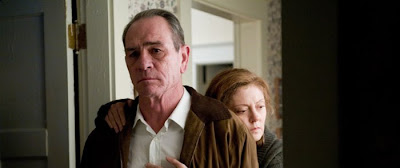
There have been a lot of movies about the Iraq War at the Toronto International Film Festival, apparently, and Variety‘s Todd McCarthy, for one, is getting tired of this mini-genre:
TORONTO — During the Vietnam War, the only Hollywood picture to directly broach the subject for many years was John Wayne’s “The Green Berets.” Unlike that era, important directors have been rushing to get their Iraq projects made and released in a timely way.
But based on what I’ve seen so far, particularly at the Toronto Film Festival, I’m in no rush to see the rest of the Iraq-centered fiction films (as opposed to documentaries) Hollywood will be serving up in the coming months, simply because I think I know exactly where they’re coming from and that I’m not going to learn anything new from them.
The trend thus far splits into battlefront recreation of atrocities, heavily influenced by docus and home-made videos (Brian De Palma’s “Redacted,” Nick Broomfield’s “Battle for Haditha“) and homefront blowback (Paul Haggis’ “In the Valley of Elah” and James C. Strouse’s “Grace Is Gone,” which preemed at Sundance). The former try to show what TV and official coverage will not — the hideousness of the carnage — while the latter seek to portray the similarly airbrushed effects the war has on American soldiers and families.
No matter the specific qualities of the writing, filmmaking and performances; the problem for me is that all these films emanate from precisely the same mindset, the safest, least provocative attitude it is possible to have: the war sucks, Bush sucks, America is down the tubes.
Does anyone in Hollywood think anything different than this? According to polls, more than 60% of Americans also agree.
Just as, during World War II, Hollywood pictures had a unified aim, to rally viewers around the war effort and present an image of the Allies prevailing, today they are also identical in nature, except in the opposite direction.
The first problem is that fictional films take at least a year, sometimes two, to create and disseminate, and thus the attitudes they reflect can be a bit stale at a time when events move so quickly (even if, alas, the war is still very much with us).
When someone like Richard Gere spouts off about Bush at the Venice Film Festival, as he just did, how much more tired can you get? Being anti-Bush simply isn’t enough, as this point; there’s an election coming up, a future to decide, complex issues to sort out, and Bush won’t be part of the equation.
Where current events are concerned, documentaries are far better equipped to tackle them than are fictional features. The film of the year for me in many ways is “No End in Sight,” a profoundly analytical, meticulously methodical and rewardingly specific study of where the U.S. went wrong once it achieved military victory in Iraq; it was the film I’d long been waiting for after the emotional hysteria of “Fahrenheit 9/11” and its ilk.
In the fictional arena, I would welcome the contemporary equivalent of something like the late John Frankenheimer’s Vietnam-related “Path to War,” a revelatory dramatization of how and why the war happened, or a (probably non-Hollywood) look at what was going on inside Saddam Hussein’s Iraq just prior to and during the invasion.
But yet another knee-jerk condemnation of Bush, wayward soldiers and misguided policy, such as exported torture (as in another underwhelming new film, “Rendition“)? I’ve been hearing all that for years and I’d rather spend my time learning and experiencing something new and forward-looking, as well as analyzing the ever-changing political map of the Middle East, not stewing in the juices of stale vitriol.
Now that the vast majority of Americans have misgivings, at the very least, about the Iraq adventure, producers are betting that mainstream audiences may be ready, up to a point, for the homefront stories of mangled, maimed and disturbed vets and their families. But the overt polemics of most of the Iraq films thus far, such as those expressed so predictably at the end of “In the Valley of Elah,” seem calculated to once again stir up the Cindy Sheehan crowd, to preach to the converted of four years ago. Move on, indeed. . . .












